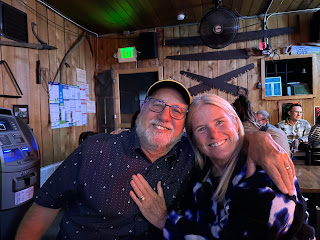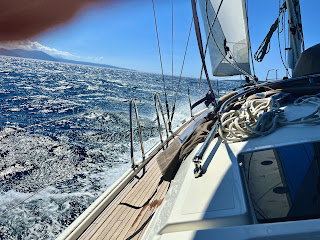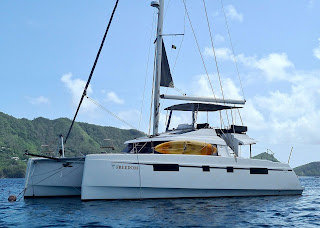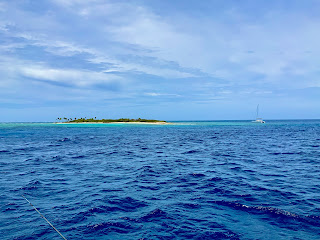Our flagship was a Moorings 4500 Catamaran with plenty of staterooms & comfortable seating. The plan was to spend several days at sea and then rest a bit at a beautiful bayside home on a secluded little bay on the west side of the island of Virgin Gorda, just north of Spanish Town.
We have all been wanting to take the boys sailing in the Caribbean ever since they were born. So 1st task of the day, to get the Grandsons squared-away on navigation - using parallel rules and dividers on real nautical charts. They are laying their first course and a “good” one it is !
We’re dropping off Hunter & Ashely and Rylan & Zane to explore the small island of Sandy Cay. The ocean swells hit this very beautiful beach with a rolling motion that makes it wise to leave some crew onboard. And even landing the dinghy on the rolling beach is a hop, jump, & grab exercise that takes some getting-used-to!
Several years ago, an local entrepreneur anchored the “Willy T” in the Bight of Norman Island and started to serve rum drinks as well as allowing patrons to jump at leisure off-the-top-of-the boat. Rylan at the helm ready to moor us along side.
Rylan took the opportunity to do some air on his wake foil while Hunter takes a few photos from the dinghy. He could ride for what seemed like an hour or more. And it attracted a lot of local attention.
Rylan & Zane at Foxy’s on Jost Van Dyke. Foxy’s is the most well-known island rum bar in the entire Caribbean. It started in the 1960’s with Foxy and his wife selling rum and cokes out of a small ice cooler sitting on the beach.
The Croan family at the Baths on the southwestern tip of Virgin Gorda. The Baths are a group of massive granite boulders that form unique tidal pools & tunnels to explore and enjoy!
Melissa and Rylan at-the-helm. Zane is forward handling the foredeck!
Sail to the North end of Virgin Gorda and then due East passing between Anguilla Point and Mosquito Island heading into North Sound where sits the unique Bitter End Yacht Club. A great place to enjoy a fabulous dinner and take a group picture with our own mooring field behind us.
Finally, a time to relax a bit. This beautiful home is nudged on a secluded small bay between Pond Bay and Mahon Bay on island of Virgin Gorda. Snorkel in the back yard, drive on the wrong side of the road, and figure out how to acquire local provisioning makes for a wonderful adventure.



















































